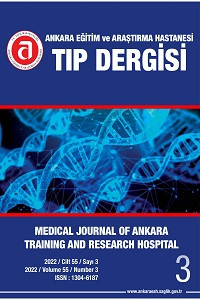Abstract
Amaç: COVID-19 pandemisi sırasında çocuklarda diyet desteği kullanım olasılığı ile ilgili veriler, yetişkinlere kıyasla azdır ve iyi belgelenmemiştir. Bu anket çalışmasında, 6-18 yaş arası çocuk ve ergenlerde pandemi kaynaklı beslenme davranışındaki değişikliklerin öngörücülerini ortaya çıkarmayı amaçladık.
Gereç ve Yöntemler: 6-18 yaş arası toplam 1327 çocuğun ebeveynlerinden, COVID-19 pandemisi öncesinde ve sırasında çocuklar tarafından yaygın diyet takviyeleri ve/veya geleneksel fonksiyonel gıdaların kullanımını sorgulayan bir anket doldurmaları istendi. Çocuklar pandemi öncesi/sırasında besin takviyesi alıp almadıklarına göre 4 gruba ayrıldı.
Bulgular: Anketi toplam 1327 katılımcı tamamladı. Grup 1'de 322 (%24,3), Grup 2'de 313 (%23,6), Grup 3'te 679 (%51,2) ve Grup 4'te 13 (%1,0) çocuk vardı. Kardeş sayısı (OR:0.747, %95 CI 0.659-0.848, p<0.001), düşük gelir (OR: 0.164, %95 CI 0.112-0.239, p<0.0019 ) ve çocuklarda COVID-19 aşısı (OR:0.694 %95 CI 0.493-0.976, p=0.03), pandemi sırasında diyet takviyesi almaya başlamanın bağımsız öngörücüleriydi. Grup 1 (hiç alınmadı) referans kategoridir.Tüm gruplar arasında en yaygın tavsiye kaynağı doktorlar, hemşire/eczacı, aile/tanıdıklardır. COVID-19 pandemisinde en çok kullanılan besin takviyeleri D vitamini, balık yağı ve multivitamin, en sık kullanılan fonksiyonel gıdalar/bitkisel ilaçlar ise pekmez, yoğurt/kefir ve sarımsak oldu.
Sonuç: Orta-yüksek gelirli aileler, pandemi sırasında çocuklarına besin takviyeleri sağlamaya şiddetle meyilliyken, düşük gelirli ve birden fazla çocuğu olan bir ailenin çocuğu olmak, diyet takviyelerine başlamanın önündeki en belirgin engel gibi görünmektedir.
Keywords
COVID-19 çocuklar diyet takviyeleri fonksiyonel gıda Children dietary supplements functional food COVID- 19
References
- 1. Lee PI, Hu YL, Chen PY, et al. Are children less susceptible to COVID-19? J Microbiol Immunol Infect 2020; 53: 371–372 2. US Centers for Disease Control and Prevention. Cases in the U.S. Atlanta, GA. Accessed June 20, 2020. https://www.cdc.gov/coronavirus/2019-ncov/cases-updates/cases-in-us.html 3. Hippisley-Cox J, Coupland CA, Mehta N, et al. Risk prediction of covid-19 related death and hospital admission in adults after covid-19 vaccination: national prospective cohort study. BMJ 2021; 374: n2244.
Abstract
AIM: Data on the likely interest in dietary support use in children during the COVID-19 pandemic are scarce and not well documented, compared to adults. In this survey study, we aimed to reveal predictors of pandemic-induced changes in nutritional behavior in children and adolescents.
MATERIAL AND METHODS: Parents or caregivers of a total of 1327 children aged 6 to 18 years were requested to fill a survey questioning the use of common dietary supplements and/or conventional functional food by children before and during the COVID-19 pandemic. Children were divided into 4 groups according to whether they received dietary supplements before/during the pandemic: those never received dietary supplements (Group 1), those already receiving/continued to receive (Group 2), those started to receive during pandemic (Group 3), those stopped to receive during pandemic (Group 4).
RESULTS: A total of 1327 respondents completed the questionnaire. There were 322 (24.3%) children in Group 1, 313 (23.6%) children in Group 2, 679 (51.2%) children in Group 3 and 13 (1.0%) children in Group 4. Number of siblings (p<0.001), low income (p<0.019) and COVID-19 vaccination in child (p=0.03) were the independent predictors of starting to receive dietary supplements during pandemic. The most dietary supplements used during the COVID-19 pandemic are vitamin D, fish oil and multivitamin. The most frequently used functional foods/herbal medicines were grape molasses, yogurt / kefir and garlic.
CONCLUSION: Moderate-to-high-income families were strongly inclined to start providing their children with dietary supplements during the pandemic, whereas being the child of a low-income family with multiple children seems to be the most prominent barrier to starting dietary supplements.
Key words: Children, dietary supplements, functional food, COVID- 19
Thanks
We would like to thank Dr.Sami Ulus Maternity, Child Health and Diseases Hospital Pediatric Cardiovascular Surgery Department Chief for his valuable help and support.
References
- 1. Lee PI, Hu YL, Chen PY, et al. Are children less susceptible to COVID-19? J Microbiol Immunol Infect 2020; 53: 371–372 2. US Centers for Disease Control and Prevention. Cases in the U.S. Atlanta, GA. Accessed June 20, 2020. https://www.cdc.gov/coronavirus/2019-ncov/cases-updates/cases-in-us.html 3. Hippisley-Cox J, Coupland CA, Mehta N, et al. Risk prediction of covid-19 related death and hospital admission in adults after covid-19 vaccination: national prospective cohort study. BMJ 2021; 374: n2244.
Details
| Primary Language | English |
|---|---|
| Subjects | Clinical Sciences |
| Journal Section | Research Article |
| Authors | |
| Publication Date | December 31, 2022 |
| Submission Date | August 28, 2022 |
| Published in Issue | Year 2022 Volume: 55 Issue: 3 |

